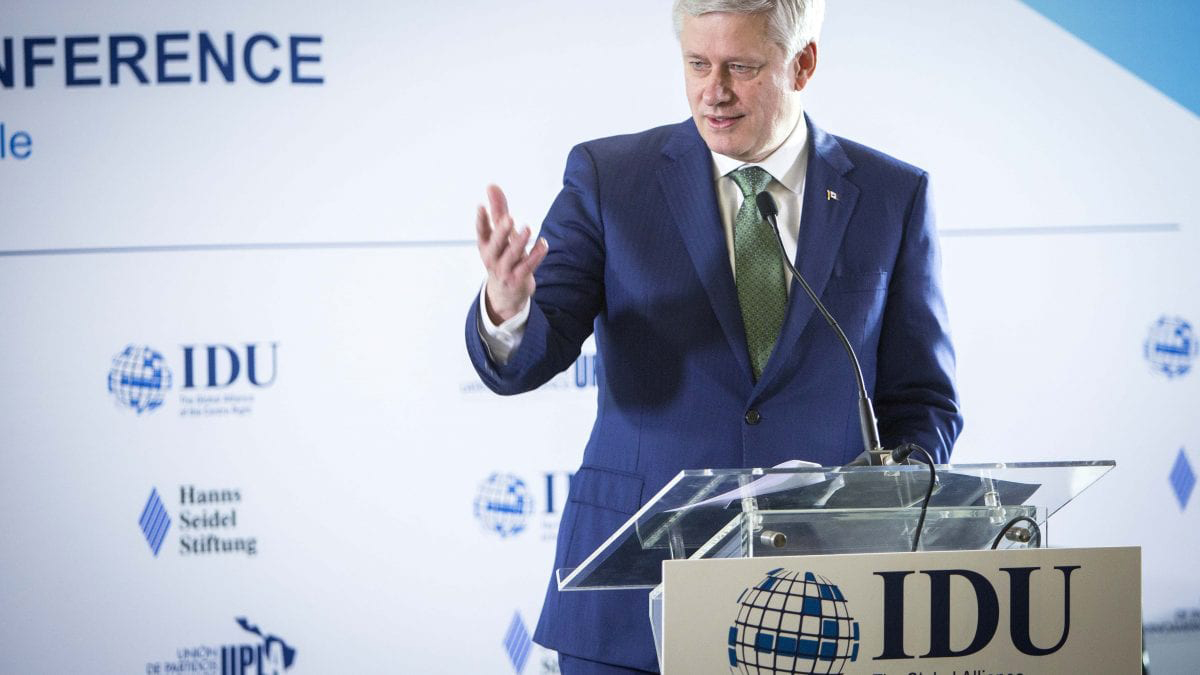The International Democratic Union: Strengthening Democracy across the Globe

The situation in Venezuela is at a critical juncture and the international community must reaffirm the resiliency and universality of democratic values and institutions. Organizations such as the International Democratic Union (IDU) are well-positioned to play a crucial role in promoting and advocating democratic principles.
Founded in 1983 by internationalists—including then-Vice President, George H. W. Bush and Prime Minister Margaret Thatcher—the IDU is a global political party network promoting center-right ideals. Chaired by Canada’s 22nd Prime Minister, Stephen Harper, today the IDU represents 80 members from over 60 countries proactively engaging on issues in support of freedom and democracy across the globe.
On April 11-13, 2019, the IDU hosted its regional Latin America Conference and Executive Board Meeting in Santiago, Chile. The political, economic and humanitarian challenges facing Venezuela and its struggle toward a democratic future were central to the agenda. The crisis served as a rallying cry among political leaders and decision makers from Africa, Asia, Europe and Latin America. During the three-day gathering, the message in support of a democratic Venezuela was consistent and centered on the following points:
-
Continued support for Interim President Juan Guaidó, who is acting in this role in accordance with Venezuela’s 1999 Constitution;
-
Maintaining political and economic pressure on Nicolas Maduro to step down;
-
Ending the humanitarian crisis that has transformed the everyday life of Venezuelans with widespread hunger, displacement, insecurity, and lack of basic necessities; and
-
Creating a path to free, fair, transparent and legitimate elections.
This message was reinforced by U.S. Secretary of State Mike Pompeo during his recent visit to Chile, Paraguay, Peru and Colombia. While regional leadership is paramount for long term sustainability, the process must be led by Venezuelans. Unlike previous attempts to regain political relevancy, support spans across the political spectrum and ideologies. As a new, young, and uncompromised leader from La Guairá in the State of Vargas, Guaidó has brought together the once-fractured opposition. Their backing of Guaidó’s charge represents the most effective strategy the opposition has had to date.
At the IDU, Delsa Solorzano, a Venezuelan legislative leader from the social democratic party, Un Nuevo Tiempo, highlighted her personal struggle with the crisis and how it mirrors the plight of the Venezuelan citizenry. Barred from leaving the country, Solorzano crossed Venezuela’s border into Cucuta, traveled to Bogota, Panama and finally Chile. Her colleague, Carlos Berribeitia, also a member of the Venezuelan National Assembly, was not as fortunate. He was stopped at the Caracas airport and prevented from leaving the country. Why? Because the Maduro regime does not tolerate dissenters telling their story outside of Venezuela. Solorzano’s sister died as a result of the lack of available medicine, and she herself was held at gunpoint by members of the armed forces when attempting to distribute humanitarian aid on February 23. Solorzano’s story is powerful, and she is a living testament to the dire situation facing the country.
In Santiago, the IDU acted. It passed an emergency resolution expressing concern for the situation in Venezuela and called upon the international community to maintain pressure on the Maduro regime and demand a democratic transition. The resolution reiterates the IDU’s support for Interim President Juan Guaidó, calls out Nicolas Maduro and his regime for causing the suffering, advocates for continued targeted sanctions, and urges that new elections are held to restore the democratic process.
The international community must continue to press for sanctions to help tighten the knot around Maduro. Solidarity around this is paramount. Maintaining momentum is critical to end the current impasse.
Top